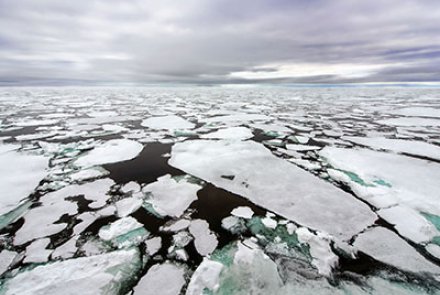
PHOTO: Christopher Michel https://www.flickr.com/photos/cmichel67/19594354566/
Real leadership can tackle climate challenge
Australia is a laggard in its response to climate challenges, but a good policy response is still possible with the right leadership, John Hewson writes.
It almost goes without saying that ‘real policy’ must be evidence-based, both in its development and implementation.
When I first became involved in public policy in the 70s, I did so in the belief that ‘good policy’ would be ‘good politics’ with a relatively short lag. Unfortunately, since then, politics has become increasingly short-term, populist, opportunistic, and mostly negative. Politics now mostly eschews essential and sensible public debate, real policy development, and broad-based reform, with often just short-term, reactive, politically expedient initiatives being implemented in response to issues as they arise.
To the extent that there is any public debate, the various ‘vested interests’, including both governments and political oppositions, now mostly claim to have their own ‘modelling evidence’ to support their positions and to intimidate their opponents, and sometimes even policy authorities. But such ‘evidence’ is usually riddled with bias and subjectivity.
These so-called ‘models’ have often been developed by starting with the desired conclusions, and then adopting assumptions to justify them. The process is, in the end, quite confusing, eschewing genuine debate, and making it impossible for governments and policy authorities to build the community support that would be fundamental to any effective policy response, while at the same time making it disturbingly easy to run scare/misinformation campaigns.
The climate ‘debate’ is one of the most compelling examples of the worst aspects of this process. The significance and urgency of the science has been essentially denied, ignored or squandered in short-term political games, point scoring, and scare mongering. It has been complicated and exploited by some of the key industry players and commentators in pursuit of their particular business objectives, prejudices and interests.
Ex-Prime Minister John Howard famously admitted, a couple of years ago, that he had consciously played short-term politics with the climate issue, and remained an ‘agnostic’, preferring to rely on ‘his instincts’ when it came to a response. I have pointed out that, with some 97 per cent of peer-assessed climate scientists agreeing on the challenge and its urgency, it is not a question of ‘religion’, but of science, and responses certainly should not be based on instinct, but rather on scientific fact.
Beyond Howard, this short-term politicking has resulted in several political leadership changes, in both government and opposition, in attempts to close down the renewable energy industry, as well as more recently to blame the industry, the ALP federal opposition, and state governments, for power outages and increases in power prices.
The ‘noise’ of these events has also been significantly complicated by the quite duplicitous and opportunistic behaviour of companies that, operating as both generators and retailers, have been able to exploit these circumstances for financial gain. Such companies have been aided and abetted by at least one major media organisation, which has consistently misrepresented the situation and encouraged personal attacks and hate mail intimidating scientists.
All this raises the question as to how the science and scientific evidence were so easily denied, ignored, or misrepresented?
To some extent, science has only itself to blame, with so much of science ‘preserved’ for scientists, a situation driven by the weight placed in academia and research organisations on publications rather than also on public education and policy contributions.
To my mind, while admittedly probably over-simplifying things, the only reason that most of the rest of us non-scientists could have heard of the climate challenge is that climate scientists have atypically agreed on the challenge and its urgency, despite it being in the very nature of science and the development of scientific knowledge to disagree and continually contest each other’s hypotheses and research conclusions. This fact provided the best possible basis for science to lead the public debate and to drive policy development and implementation.
However, political and policy development opportunities were lost too. For example, I could never understand why Prime Minister Gillard, having decided to revoke her election commitment to ‘never put a price on carbon’, not only didn’t offer any real explanation for such a backflip, but also just simply announced that decision in February 2010, without attempting to provide any detail until July. This gave Abbott a ‘free-kick’ every day throughout that period and enabled him to run a massive scare campaign based on a multiplicity of outrageous and indefensible claims.
The important opportunity was lost for Gillard to seek to explain the science, to link the science to a range of policy options, and to then delineate and defend her particular policy response. The result was a collapse in community support for a decisive response to climate change, the loss of her job and ultimately, an election loss for the ALP. This loss was subsequently taken by Abbott as a mandate to try to ditch any substantive response to climate issues, to scrap the carbon price, to dismantle the architecture of the Emissions Trading Scheme, to attempt to abolish key climate agencies such as the Climate Change Authority, the Clean Energy Finance Corporation and the Australian Renewable Energy Agency, to ditch the Renewable Energy Target, and to attempt to close down the renewables industry completely.
As with so many areas that are in need of broad-based reform, much of the climate policy development work has essentially been done, and it is generally known what policy responses are required. The evidence is there to be marshalled.
What is needed is leadership, preferably bi-partisan, in the longer-term national interest. At the political level, this will require somebody to stand up, step outside the 24-hour media game, and be prepared to lead, to delineate an evidence-based response and to take on the short-term dissent from the public or their party. Nothing can get done in government unless some person or group owns the issue and is prepared to explain and defend it.
But, this is not just a challenge for our political leaders – the scientific, business and broader communities should also play their part, in coordination. There are three key stages to the public process – first, building the essential broad-based community support (they must sign off on the challenge); delineating and debating the main policy alternatives; and, then, delineating and defending the preferred policy response, in the national interest, taking on all doubters and vested interests.
Few public policy issues have as much evidence to be drawn on as the scientific basis of the climate challenge, and the range of possible policy options has been analysed exhaustively. It will only take political will and broad-based commitment.
Too much time has been lost in dealing with the climate challenge. Globally, we are probably at or past a tipping point to achieve the minimal objective of net zero emissions by mid-century. Australia is a ‘laggard’. But, a substantive, evidence-based policy response is still possible with the right leadership.
This article was first published by Policy Forum.net, the website of the Asia and the Pacific Policy Society and Crawford School. https://www.policyforum.net/real-leadership-can-tackle-climate-challenge/
John Hewson will be one of the speakers at the upcoming Crawford School & Policy Forum event, Bridging science, economics and policy silos. Find out more here: https://crawford.anu.edu.au/news-events/events/8711/bridging-science-eco...
Updated: 13 July 2024/Responsible Officer: Crawford Engagement/Page Contact: CAP Web Team













